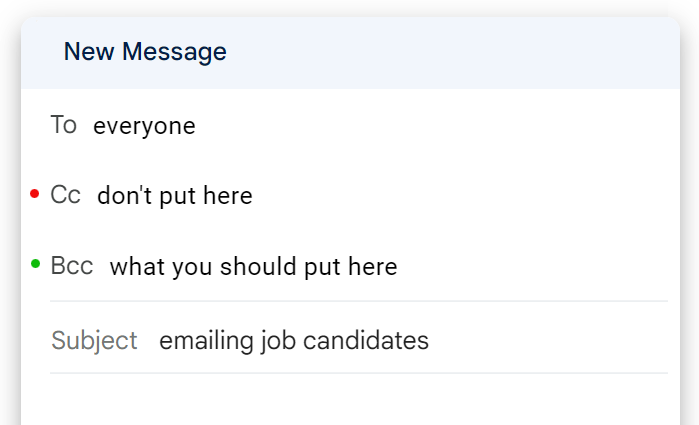NUS Philosophy Apologizes for Rejection Email Mishap
To its credit, the Department of Philosophy at National University of Singapore, in a timely manner, emailed some applicants to its recently advertised open rank position to inform them that they were no longer being considered for the job. Unfortunately, the email addresses of all of the recipients of the rejection letter were visible in the “cc” section of the message.
The result was that over 200 people were exposed as having applied to the position.

For some, this is no big deal, for others, it is. It’s a kind of privacy violation, but as one reader of Daily Nous put it in an email, the error also puts some “scholars in precarious positions at risk, since many do not want their employers to know that they are applying elsewhere,” for fear of upsetting them, or giving them reason to not renew their contracts.
Once notified of the error, the search committee member responsible for it wrote to the affected candidates to apologize.
When contacted about the mishap, the Department also issued a public apology:
While notifying unsuccessful job applicants to our open rank position, the candidates were mistakenly cc’ed instead of bcc’ed by a search committee member. This was a horrible mistake on our part. It did not show respect for those job applicants who applied for our position; it was an egregious violation of privacy; and worst of all, it has potentially harmed many vulnerable members of our profession, particularly those who might be in precarious employment. Going on the job market is a stressful enough experience at the best of times; to our shame, we have made things unequivocally worse for those who have trusted us enough to apply to our position. There’s no excuse. We have to do better, and we will do better. We are reviewing our application handling procedures, including communication with applicants, to ensure that there is no repeat of this incident. We sincerely apologise to everyone affected by this error.
This is the kind of mistake that anyone is susceptible to making, and so perhaps all hiring departments should take a moment to review the procedures they have in place for communicating with job applicants so as to decrease the risk of these and similar errors.



People applying in Scandinavian countries should be aware that this is completely normal practice here. In fact, it is even required by law to make all applications accessible to all applicants.
Harlad is absolutely right. But it is not just the *applications* from all applicants that are available for everyone to see. So are the *evaluations* written by up to three external experts asked to rank the candidates. If you wish to know what others really think of your research (and wish to make that information available to others), you should apply for a position in Scandinavia.
Yes, you are right. I almost fell from my chair when I received a giant pdf with everyone’s applications and reviews. I knew probably half of the applicants personally…
I have applied for jobs in Norway, Finland, Sweden and Denmark and never have I received any information on other candidates.
Then you could appeal the entire process. I am working in Sweden now, and I know for a fact that this is required by law.
Do you know if this also applies to fixed-term jobs such as funded positions for PhD students?
Scandinavian universities (Norway one example) in the rejection email attach a document: with the name, “age”, and the reasons for rejection of all candidates; the email shares this info among all the poor rejected ones.
My only worry is that the suggestion that they “review procedures” suggests a bureaucratization common at other universities, where HR prohibits search committees from ever communicating with the rejected applicants, or only doing so like 8 months later, through the HR departments.
A screwed up email ought not lead to the conclusion “we should not email rejected applicants [in a timely manner].” It wouldn’t be good for us.
There’s no procedure to review. Someone flubbed a mass rejection email. The procedure next time should be “make sure you use bcc.”
Dear Junior Faculty,
I agree, and the timely rejection email came with good intentions, although the execution was obviously unfortunate in this case. We haven’t had the chance to properly discuss it as a department, but perhaps something like ensuring there are another pair of eyes checking the email before it gets sent out might be a good additional failsafe. We welcome any suggestions that you or anyone else might have for improving our processes.
Regards,
Qu
I was one of the rejected applicants. For what it is worth, I wasn’t too bothered by this. I’ve made mistakes like this myself, and I think most people on that email understand that mistakes happen. I was also just glad to get a rejection email, since most departments don’t send them.
I realize that some applicants are in a very different position, and I think Justin is absolutely right to call for safeguards. But it’s also important to remember that many of us will be just fine. (And I hope that everyone on that email has the good sense not to forward the list of names, in the interest of everyone else).
Back in the day – some twenty years ago or more – I received a similar email from a UK philosophy department. As well as cc’ing all the rejected candidates – there were at least a hundred – it also had the subject line ‘Rejects’. Perhaps some readers of the current post were recipients of the same email.